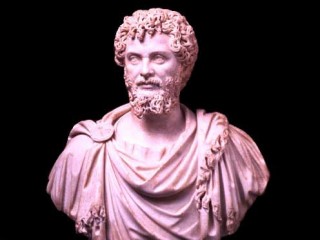
Lucius Septimius Severus biography
Date of birth : -
Date of death : -
Birthplace : Leptis Magna, Africa
Nationality : Roman
Category : Historian personalities
Last modified : 2010-09-10
Credited as : Roman Emperor, fought the Caledonians,
1 votes so far
Sidelights
Lucius Septimius Severus (born 146 in Leptis Magna, Africa - died 211 in York, England) was a Roman emperor. His reign is notable for the militarization of the government, growing Oriental influences in society, and high development of civil law.
Severus was an African from Leptis Magna. He rose through the regular course of Roman offices, was consul in 190, and was serving as governor of Upper Pannonia in 193, when Emperor Pertinax was murdered by the praetorian guard. Severus's command of 12 legions and proximity to Rome made him a favored contender for the throne. He appeared in Rome as the dead emperor's avenger and won the senators' approval by promising them respectful treatment, by disbanding the praetorian guard, which he replaced with elite from the legions, and by naming his Western rival, Albinus, his caesar (successor-designate).
After defeating his more formidable rival, Pescennius Niger, in 194, Severus started a successful campaign against the Parthians. But fear of the activities of Albinus in the West led Severus to break off his campaign and hurry back to Gaul to meet and defeat his rival at Lyons in early 197.
Now firmly established, Septimius began to show more candidly his sentiments toward Roman traditions. He had 29 senators executed on suspicion of favoring Albinus, and their property was confiscated. Famous cities, such as Byzantium, Antioch, and Lyons, were humiliated or destroyed. And his elder son, Bassianus (Caracalla), was renamed Marcus Aurelius Antoninus, in pretense that Septimius had been adopted into the prestigious Antonine family of emperors.
A Parthian attack in 197 brought the Emperor back to the East. He captured the Parthian capital at Ctesiphon and reestablished a province of Mesopotamia. From 199 to 202 the Emperor visited various Eastern provinces, where he established frontier outposts and improved the living conditions of the soldiers.
For the next 6 years Septimius remained chiefly in Rome. His administrative activities included pay raises for the troops, whom he also allowed for the first time to marry while in service. Veterans were given rapid advancement in the civil service, and the bureaucracy became militarized. Italy's formerly preferred status in the empire was lessened, while favored status was given to many places in his native Africa and his wife's homeland in Syria. Severus appointed prominent jurists to high administrative posts; and the appearance of a number of Rome's greatest legal names on the Emperor's council brought a humane approach and increased protection for the humble in the legislation of the Emperor.
From 208 to his death at York in 211 Septimius was in Britain fighting the Caledonians. Whether or not he really advised his sons on his deathbed to enrich the soldiers and disregard all others, the anecdote is a just estimate of the direction he gave the Roman world.
















